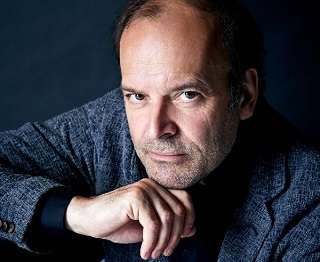|
Back
Filling in for Buchbinder, Louis Lortie brings a massive Beethoven sound to Philadelphia stage Philadelphia
Perelman Theater, Kimmel Center
02/11/2020 -
Ludwig van Beethoven: Sonatas No. 3 in C major, Op. 2, No. 3, No. 8 in C minor “Pathétique”, Op. 13, No. 6 in F major, Op. 10, No. 2, & No. 23 in F minor “Appassionata”, Op. 57
Louis Lortie (pianist)

L. Lortie (© Elias.Photography)
This, the 250th anniversary year of Ludwig van Beethoven’s birth, is not a time for timid souls. It is a year to speak out, shout if necessary, against restrictions placed on artists, against injustice, and to express the full gamut of human emotions from sly humor to rage, from introspective spirituality to world-transforming joy. Beethoven’s 32 piano sonatas can deliver those emotions as no other music can, and Louis Lortie is the pianist to express them, full throttle and unapologetically.
Originally, Rudolf Buchbinder was scheduled to perform this program of four sonatas completed in Beethoven’s early years in Vienna. The concert would represent a key place in the Philadelphia Chamber Music Society’s complete Beethoven piano sonata and string quartet cycles this season. Because of health issues, however, the Austrian pianist was forced to cancel his only U.S. concert this season, leaving a gap for PCMS to fill. On short notice, the French-Canadian pianist Louis Lortie agreed to present the same program exactly one week later. To sweeten the deal, PCMS arranged to provide a Bösendorfer piano, an instrument not only of rare refinement, but one able to withstand Lortie’s physically demanding style.
Few would deny that the original (or period) instrument movement of recent decades has resulted in a wealth of intriguing, what we imagine as authentically replicated, interpretations of classical works. There is much to be said for this approach which proponents believe helps us hear and understand the music as it was performed 200 or so years ago, perhaps even as it was intended by the composers. But there is also a place for a more dramatic approach which exploits the capabilities of modern instruments. In the case of the Beethoven sonatas, we may hear the music not as 18th or 19th century audiences would have heard them, but as a daring composer would have imagined if modern instruments had been available. To support this, it is well known that the evolution of the piano in the 19th century was largely dictated by Beethoven’s and other artists’ demands for bigger instruments with greater range and more expressive nuances.
This being said, Lortie’s performance throughout the concert was passionate, sculptural in the sense of shaping the sound to reflect the composer’s intent, and unflinchingly powerful, reflecting accounts of Beethoven’s own playing in his younger years. This was apparent right from the start with the pianist’s exuberant approach to the often-neglected Op. 2 No. 3, written during Beethoven’s early years in Vienna when he was still a pupil of Haydn. We often hear this work presented as a whimsical trifle, replete with little puns and sudden but not overpowering surprises. Lortie, on the other hand, presented this work as a sonata to be taken seriously. The whimsy is there, but so is a commanding presentation amplified by the mellow but substantial sound of the Bösendorfer. The humor is Jovian, the runs and leaps of the pianist’s fingers over the keyboard are wild and untamed. In contrast, Lortie delivered the gentle melodies of the second movement with understatement, reverence, and control. The modulation and shift in the Adagio to the animato un pochettino in measure 11 through the following mysterious passage is one of the most haunting sounds in Beethoven’s music, almost other-worldly. The scampering playfulness of the third movement was breathtaking, while the fourth alternated lighthearted sallies with explosive variations bursting through the straitjacket of late 18th century harmony.
Noteworthy about Lortie’s striking performance of the Pathétique was his relentless momentum, knowing exactly where this work was going and using both speed, force, and keen intelligence to get there. Of course, in this case, the journey is more important than the destination. His reading of the familiar second movement was dynamically rich, and warm in tone. I loved the way he hung on to that final note, before taking half a breath and launching into the final movement, rife with action—flowing melodies, key changes, 16th notes flying against each other—before a dazzling conclusion.
Following intermission, Lortie played another gem from the lesser performed sonatas, the F major Op. 10 No. 2. In the first movement, Beethoven creates a musical collage of snips and bits of different themes, sometimes tied together, other times divided by the great roar of the bass notes. The main theme of the second movement rises above this sweet cacophony like a bud blossoming in time-lapse photography. The work speeds frenziedly through the third movement, ending with a dramatic dash we can only imagine young Beethoven providing with a flourish to a spellbound courtly audience.
The program concluded with the Appassionata, with its whispered opening that swells to a great roar of sound in the first movement. Again, the drive, the sense of momentum was tremendous. Here, about two-thirds of the way through the first movement, the treble arcs of 16th notes, almost like an ostinato, seemed to have a slightly tinny ring to them, but the moment passed, and in the middle movement, Lortie spun a rather ordinary melody into variations that were pure musical gold. The second variation, with the melody in the bass, always startles and delights with its fresh, unexpected simplicity. Lortie concluded the sonata with the power and affection with which he opened the program, a vision of Beethoven, not necessarily as he was heard in his time, but as the unequalled musical king of beasts.
Linda Holt
|